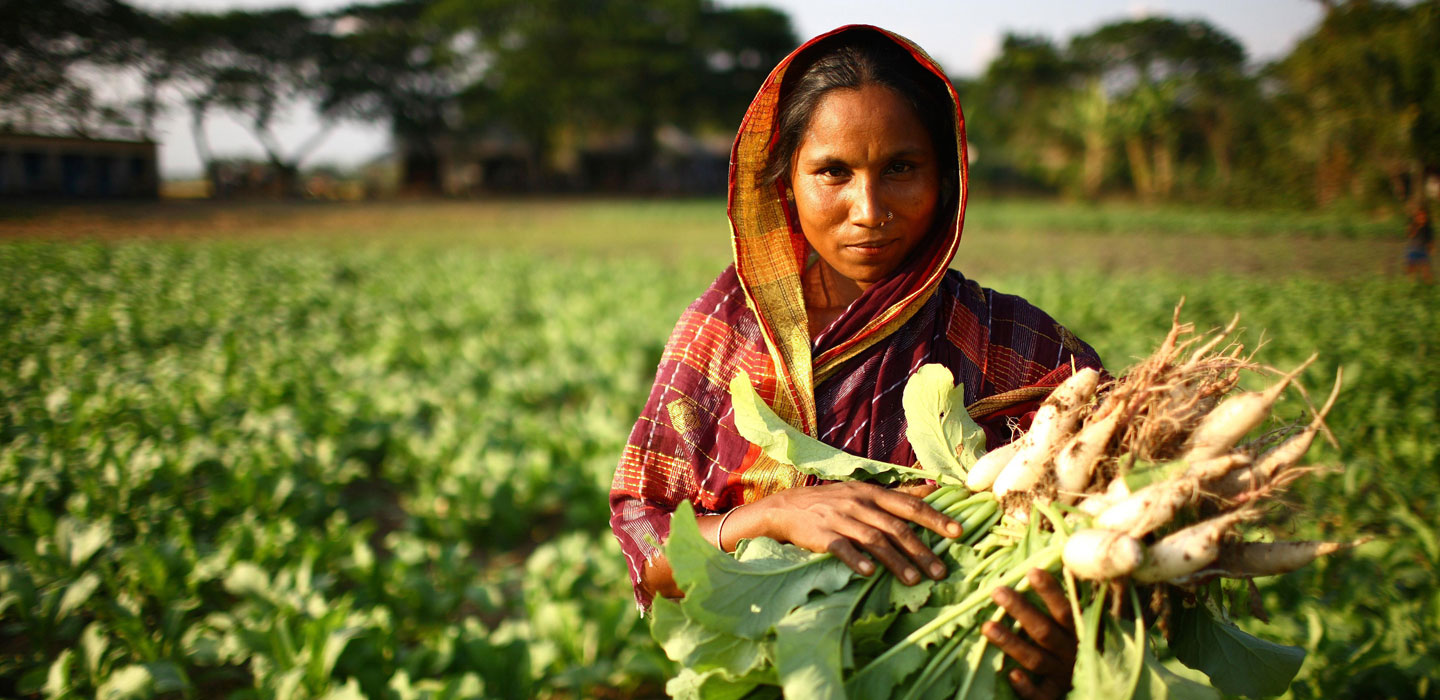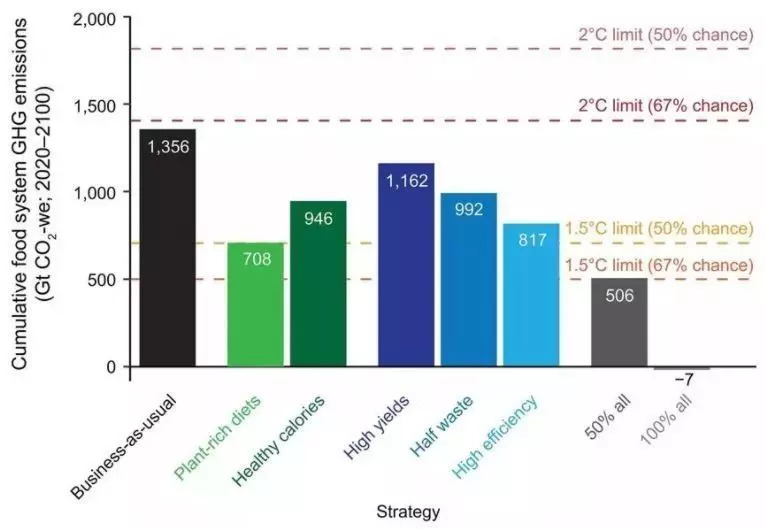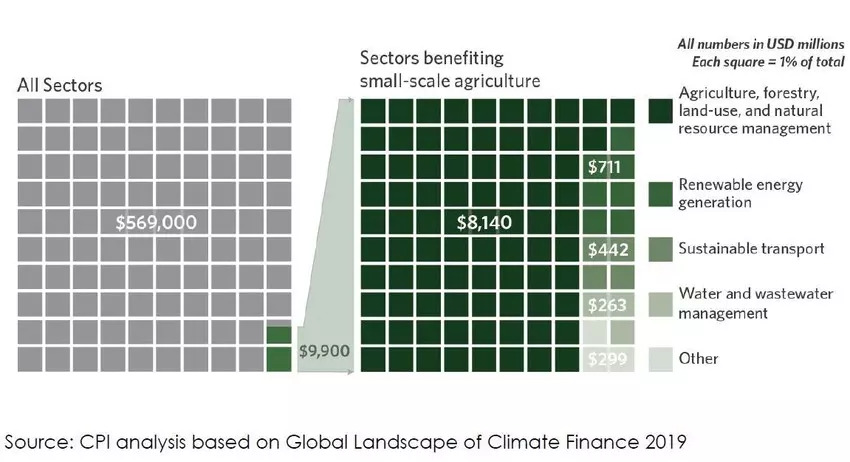Why small farms are key to the future of food - and how we can support them
IFAD Asset Request Portlet
Publicador de contenidos
¿Por qué las pequeñas explotaciones agrícolas son clave para el futuro de los alimentos y cómo podemos apoyarlas?
Tiempo estimado de lectura: 5 minutos
- Los pequeños agricultores y las poblaciones rurales se encuentran en una situación de extrema pobreza y hambre.
- Pero también son la mejor esperanza para aumentar la productividad de la tierra y la diversidad de los cultivos para alimentar a un mundo en crecimiento.
- A continuación, les presentamos cinco formas en las que podemos apoyarlos y crear sistemas alimentarios sostenibles e inclusivos.
En los 25 años transcurridos desde que Clayton Christensen denominó el término "innovación desestabilizadora", se ha escrito mucho sobre los beneficios de reorganizar las prácticas comerciales establecidas. Incluso antes de la actual pandemia, había un creciente reconocimiento de que nuestros sistemas alimentarios también necesitaban ser rediseñados.
En la actualidad, los sistemas alimentarios deberían alimentar a 7.800 millones de personas sin comprometer la productividad futura o la salud de nuestro planeta. Sin embargo, también es preciso que recompensen y reconozcan equitativamente el trabajo de los millones de personas que se encuentran en su base, en particular los productores en pequeña escala.
Próximamente en español.
What is the urgency?
Hunger is both a result of conflict and a cause. It is bad for human health, economic growth, peace and development. Last year, 690 million people went hungry. Under-nutrition stunted the growth and future prospects of 144 million children. Climate change has affected our rivers and oceans and helped agricultural pests and disease multiply.
This was before the impact of the COVID-19 pandemic, which may push another 132 million people into hunger. Small-scale farmers and other rural people are disproportionately represented among the numbers of the poor and hungry.
Demand for less variety and more processed foods are shaping Global food systems. There has been a 75% loss of plant genetic diversity on farms in the past 100 years.
Just four crops - wheat, rice, maize and soybean - provide two-thirds of human caloric intake. With fewer species and varieties, our food systems are more vulnerable to pests and disease.
Meanwhile, our current system of food production uses about 75% of the world’s accessible freshwater. It is responsible for 20% to 30% of all greenhouse gases. It is a primary contributor to biodiversity loss. And one million species are threatened with extinction – including pollinators, without which humans would be extinct.
 |
| Emissions will take Earth’s temperature past a 1.5°C rise in the 2060s, unless we transform our food systems. © Science Magazine |
Why should we care about small farms?
Small-scale farming systems already grow 50% of our food calories on 30% of the agricultural land. When access to inputs and conditions are equal, smaller farms tend to be more productive per hectare than much larger farms.
Family farmers have a vested interest in protecting the fertility of their soil and the long-term productivity of their land. They are also more likely than larger farms to grow a wide variety of crops, contributing to agro-biodiversity.
IFAD’s experience shows that when given the opportunity, small-scale food producers are quick to invest and grow their business. Even in situations as complex as the Sahel, these investments yield results.
Last year, on a visit to Mali, I met a young farmer and entrepreneur named Nouhoum Sidibé. Nouhoum had been saving his money to migrate to Europe when he heard about an IFAD-supported project aimed at empowering young women and men in rural areas. With a loan and training, Nouhoum was able to start a poultry business.
He began with just 10 chickens. Today he is raising 3,500 chicks five or six times a year and employs seven people. In a country where average salaries are $1,500, his annual income is more than $12,000. He is investing in his business and community instead of saving up to leave.
Every year, IFAD-supported projects raise the production of 15 million small-scale producers and increase the value of sales of another 16 million, significantly raising the income of 20 million rural people.
Creating a virtuous circle
Rural and urban societies and economies alike benefit from prosperous and productive small farms. This creates jobs and wealth for their communities, reduces pressure on young people to migrate, and contributes to more stable and peaceful societies.
When small-scale farmers earn more, they inject their incomes directly into the rural economy, creating growth and diversification. Almost every example of large-scale national poverty reduction was kick-started by rising incomes among small-scale farmers.
What can we do to catalyse this virtuous circle?
First, we need to make markets work for small-scale farmers. Even in advanced economies, only a tiny fraction of the retail price of food reaches the farmer. The situation is even worse in low- and middle-income countries.
Small-scale farmers need to be able to get their goods to market and to earn decent incomes from selling them. This means investing in storage and transport infrastructure to reduce waste and enable market access. And, it means investing in digital technologies so that farmers can access market information – especially important during times of pandemic.
Second, public and private investment is needed to link rural and urban areas. This includes better roads, electricity and internet connectivity. Investments are also urgently needed to help small-scale farmers adapt to climate change.
 |
| Share of annual climate finance in small-scale agriculture 2017/2018 rounded in USD million. |
Third, we need to empower women and youth to unleash their potential. This includes protecting their rights to land and assets and ensuring they have better access to markets, finance and technology.
Fourth, we need to invest in research and innovation that benefit small-scale farmers; today, agricultural research tends to neglect them. This research needs to be accompanied by technical advice, training and ICTs.
Fifth, small-scale farmers and their organizations need to be linked to relevant policy and planning processes - especially those around food systems in both rural and urban areas. Among other benefits, this would create opportunities for small-scale farmers to sell their products to people in large towns and cities. As well as creating new income-earning opportunities, their involvement would contribute to meeting food and nutrition needs in cities.
Making small-scale farmers a priority
Small-scale food producers must be at the centre of next year’s global food system summit convened by the UN Secretary-General António Guterres. This means putting agriculture – and the needs of small-scale farmers – high on the global political agenda and high on the list of recipients of global investments.
Thriving small-scale farmers and sustainable and inclusive food systems contribute to a brighter future for rural and urban populations alike across the planet.
This article also appears on the World Economic Forum as part of the Bold Actions for Food as a Force for Good.
Fecha de publicación: 23 noviembre 2020